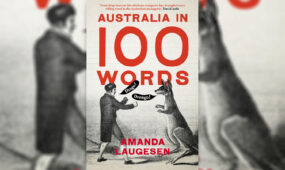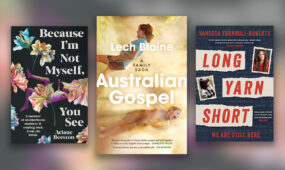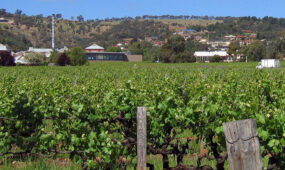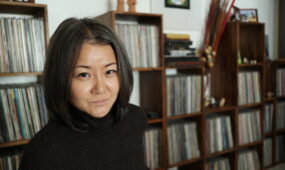The Icelandic saga of Kari Gislason and Richard Fidler
Books & Poetry
Through travelling and telling stories in the harsh and beautiful landscapes of Iceland, friends and co-authors Richard Fidler and Kari Gislason found a deep connection to the country and its ancient sagas.

Saga Land is an exploration of heritage at multiple levels.
Kari Gislason is Icelandic by birth, but moved to Australia at the age of 10 with his mother, and was kept from his father, who already had a wife and five children.
He yearned for a relationship with not only his distant family, but also with his home country, and through that yearning he found the Icelandic sagas – the real stories of the Vikings who settled on the island in the Middle Ages.
At 27, while studying for a PhD in Icelandic literature, he received a small travel grant to get him to Iceland. There, he reconnected with his father, and through one innocuous comment a seed was sewn that what would eventually become Saga Land.
Gislason’s father told him it was no surprise that Kari was so drawn to literature – after all, he was a descendent of Snorri Sturluson, one of the greatest of the Icelandic saga authors.
The thought of this familial lineage nagged at the author, but there was no way for him to verify it. His father passed away, and because of the circumstances of Gislason’s birth, he was not registered in the Icelandic genealogical database – known as The Book of Icelanders.
Good literature and stories and places do help you with your own life and your own sense of meaning
In order to trace his family history, he would need to go back to Iceland and apply to be included in the database. He told this to his friend, Richard Fidler, who he had met when he appeared on his ABC radio interview program, Conversations.
“I’d always wanted to go to Iceland, too. I’d always dreamed of it,” Fidler told InDaily during the pair’s recent visit to Adelaide to launch Saga Land at an event hosted by Matilda Bookshop.
“I had this odd desire as a kid to go to this fabulous and strange place, and I couldn’t believe that there was a nation and a city that far north, so close to the Arctic Circle.”
Fidler’s interest piqued further after Gislason introduced him to the Icelandic sagas.
“I had a vague idea about them and I thought they were fantasy tales, like Beowulf – Vikings battling monsters and that kind of thing. But they’re not at all; as Kari showed me, they’re stories of real people,” he says.
“The first saga I’d ever heard… [was] the Saga of Gunnar and Hallgerd, these two figures, and he [Kari] was able to tell it in like seven minutes or something, and I thought, ‘Oh my God, this makes perfect radio’.
“Kari said he was going to Iceland in 2015, and so I said, ‘Oh man, I’m going to come with you, let’s have a radio project together’, which is where the genesis of this was.”
For the radio program (available as a podcast through the ABC RN website), the duo visited the sites of the sagas and told the stories in the landscapes where they happened, all the while tracing Gislason’s heritage to answer the question of his familial connection to them.
This was an overwhelming experience for Gislason.
“I think the fact that we told these stories in the places where they occurred made me feel as though the stories were part of my understanding of Iceland,” he says.
 “We were travelling around this island for a few weeks, and we started off visiting the genetics database place where they would have the answer to my questions about my heritage and my genealogy.
“We were travelling around this island for a few weeks, and we started off visiting the genetics database place where they would have the answer to my questions about my heritage and my genealogy.
“When we started that, I was a bit brittle about it all, and I was a bit resistant to Richard, who was trying to help me through all of this stuff, but I was kind of pushing back a bit.
“We then went on this odyssey around this island, telling these stories, and weirdly, telling them calmed me in my own search for my own past.
“So I don’t know what magic happens whereby visiting something [from] 1000 years ago solves something now, but I know it’s possible. I know that literature, good literature and stories and places do help you with your own life and your own sense of meaning. That definitely happened for me.”
For Fidler, the expedition was a “voyage of discovery”.
“It was a way of being introduced in a very powerful way to this country, thanks to Kari, who knows so much about it, and I kind of observed while I was there that no one in the history of the world loves Iceland as much as Kari does,” he says.
“I kind of saw it, as Kari’s friend, as a process of bringing him back into the bosom of Iceland, if that’s the word, having had this awkward relationship with family, which was through no fault of his or his siblings, of course, having been held at a distance.

Get InReview in your inbox – free each Saturday. Local arts and culture – covered.
Thanks for signing up to the InReview newsletter.
“This way of finding this connection was a way of properly integrating himself into Iceland, and to put his name properly connected into The Book of Icelanders.”
It was, at times, a tense experience, but one that made the telling of the stories, on radio and now in print, as well as Gislason’s connection to his birthplace, all the more rich.
Saga Land is available now through Harper Collins, and both authors will be in Adelaide in March next year as guests at the Adelaide Writers’ Week. For more details and the full roster of authors appearing at Adelaide Writers’ Week, see the website.
Support local arts journalism
Your support will help us continue the important work of InReview in publishing free professional journalism that celebrates, interrogates and amplifies arts and culture in South Australia.
Donate Here






Comments
Show comments Hide comments